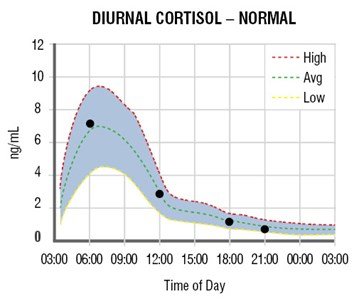Tips for Adrenal Health
By Dr. Stephanie Karozos, MD
Are you waking up at 3am every night, unable to fall back to sleep? Are you having difficulty falling asleep at night despite being tired during the day? Are you just plain tired all of the time? These are a few of many symptoms of adrenal dysfunction, indicating that your body is having issues with the release of cortisol, a stress hormone. Other symptoms of adrenal dysfunction include but are not limited to acne, weight changes, irritability, depression, anxiety, blood pressure changes, and irregular menstrual cycles. If you are having any of these symptoms, please seek the care of a trusted healthcare professional (preferably an Integrative or Functional medicine provider) for a thorough exam and testing.
https://www.zrtlab.com/landing-pages/diurnal-cortisol-curves/
Cortisol should follow a predictable curve, spiking in the morning when you wake up and decreasing throughout the day (fig 1). However, with our fast paced lifestyles, stress, and constant exposure to screens, our cortisol levels are more easily disrupted than they may have been in the past. There are certain patterns of disruption that can be identified: cortisol spikes too early, waking us up in the middle of the night or keeping us awake all night, or remains too high throughout the day, making it difficult to fall asleep and easy to feel anxious and irritated. Your cortisol curve can also flatten, instead of spiking in the morning the levels are low and remain low throughout the day, leading to chronic fatigue. Here are some safe, easy ways to regulate your cortisol levels.
Mindfulness: Meditating or practicing another form of mindfulness can help to relax the mind and body, which in turn can help regulate cortisol release. Try starting with just a few minutes a day, gradually building up to 12 or more minutes of daily practice.
Exercise: Exercise can help regulate cortisol release, and the type of exercise you do can influence your cortisol levels. High intensity exercise can induce cortisol release. If you are feeling fatigued, introducing a high intensity interval workout in the morning can induce a cortisol spike, helping to provide feedback to your body that a cortisol spike should, indeed, be occurring during that time. If you suspect that your cortisol levels are too high, low intensity exercise like a brisk walk or hike, jogging, a steady-state bike ride or swim, and yoga can help to lower cortisol levels, calming your mind and body. Over-exercising can cause dysregulation of cortisol levels, so aim for 20-30 minutes daily when you are exercising to regulate cortisol release.
Adaptogens: Adaptogens are a category of herbs and mushrooms that can help the body cope with physical or emotional stress. They are typically safe, working on the adrenals to reduce or increase cortisol to normalize your body’s stress response. If your cortisol is too high, an adaptogen would help lower it, and vice versa. This can have the effect of either calming the body or increasing energy levels, depending upon what your body needs. To learn more, check out this post on adaptogens.
Blood sugar stabilization: Blood sugar crashes can increase cortisol in the body, and elevated cortisol can cause high blood sugar. It stands to reason, therefore, that regulating blood sugar levels to keep them stable would lower cortisol and help keep the curve stable. A few simple hacks for regulating blood sugar (via the book, Glucose Revolution by Jessie Inchauspe) are listed below:
-
- Start each meal with a veggie whenever possible
- Eat your foods in this order: veggie, protein/fat, starch
- Walk for 10-20 minutes after eating
- Eat a savory, rather than sweet, breakfast (whole fruit should be the only “sweet” in your breakfast)
Caffeine regulation: Caffeine can increase cortisol levels. Reducing your caffeine intake can improve cortisol levels. If you are drinking 2 cups a day, try 1 instead and see if you notice a difference in your stress and sleep. Consider eliminating caffeine altogether for at least a brief period of time. Instead of drinking coffee first thing in the morning, try switching to a caffeine free substitute until you’ve eaten something with protein and/or fat, then drink your coffee or tea after you’ve eaten.
Light exposure: Walk or stand outside in the morning and evening light for a few minutes each day to help cue normal cortisol release and to regulate your circadian rhythm. Blue light that is emitted from TV and phone screens can lead to an increase in cortisol before bedtime and a lower than normal cortisol release in the morning. This can disrupt sleep patterns, which can affect our caffeine intake and exercise habits, further interfering with our cortisol release patterns. Try blue light blocking glasses and avoiding screens for an hour or two before bed. When you are using screens before bed, install a blue light filter or use red-tinted glasses to prevent cortisol surges at night. You’ll be amazed at how quickly you fall asleep!
If you found this article helpful and think you could benefit from a visit with an Integrative doctor, call Aspen Integrative Medicine at (970) 927-0308 or click here to schedule a visit with Dr. Karozos.

